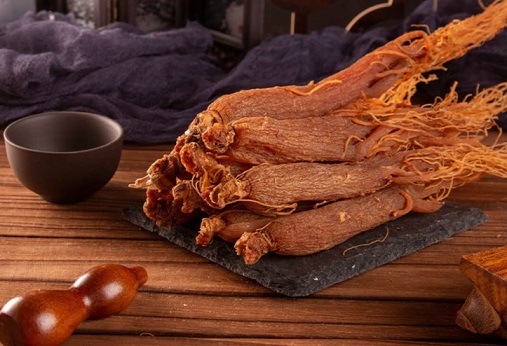Breaking! Study Shows That Korean Red Ginseng Can Actually Help with Neural Regeneration!
Nikhil Prasad Fact checked by:Thailand Medical News Team Jan 14, 2025 10 months, 4 weeks, 2 days, 1 hour, 17 minutes ago
Medical News: A New Perspective on Brain and Retinal Healing
A groundbreaking study conducted by researchers from Konkuk University, Kangwon National University, and Hanyang University in South Korea has unveiled the potential of Korean Red Ginseng Extract (KRGE) in promoting neural regeneration. By examining the intricate interactions between astrocytes and neural stem cells (NSCs), the research highlights a promising avenue for enhancing brain and retinal health.
 Study Shows That Korean Red Ginseng Can Actually Help with Neural Regeneration
The Role of Astrocytes and Neural Stem Cells
Study Shows That Korean Red Ginseng Can Actually Help with Neural Regeneration
The Role of Astrocytes and Neural Stem Cells
Astrocytes, the star-shaped glial cells in the brain and retina, play a pivotal role in supporting neural function. They facilitate the communication between the vascular and neuronal systems, ensuring proper oxygen supply and maintaining the health of retinal and brain cells. NSCs, on the other hand, are the building blocks of the nervous system, capable of differentiating into neurons, astrocytes, or oligodendrocytes. However, the exact mechanisms through which these cells regenerate and differentiate remain a topic of scientific curiosity. This
Medical News report explores how Korean Red Ginseng induces specific cellular processes to promote regeneration.
Korean Red Ginseng and Hypoxia-Inducible Factor
Korean Red Ginseng is derived from Panax ginseng, renowned for its therapeutic properties. In this study, researchers focused on the impact of ginseng on hypoxia-inducible factor-1α (HIF-1α), a protein that regulates cellular responses to low oxygen levels. Their findings revealed that KRGE stimulated HIF-1α in astrocytes, creating an environment conducive to NSC differentiation and maturation. This effect was observed both in the brain and retina of mice treated with KRGE.
Study Details and Key Findings
Using animal models, the team administered varying concentrations of KRGE to investigate its impact on neural tissues. They found that KRGE-treated mice exhibited increased co-expression of neuroglobin (Ngb) with neuronal markers such as NeuN in the brain and MAP2 in the retina. Ngb, a protein associated with oxygen transport and neuronal survival, was predominantly found in mature neurons.
Interestingly, while direct KRGE treatment did not increase Ngb expression in isolated NSCs, it had a profound effect when applied to astrocytes. Astrocyte-conditioned media from KRGE-treated cells induced NSCs to differentiate into Ngb-expressing mature neurons. This finding underscores the importance of astrocyte-derived factors in neural regeneration.
HIF-1α as a Central Player
The study further demonstrated that HIF-1α plays a critical role in this regenerative process. When HIF-1α expression was suppressed using specific RNA interference techniques, the ability of KRGE-treated astrocytes to promote NSC differentiation diminished significantly. This suggests that HIF-1α is essential for the secretio
n of factors that drive NSC maturation and Ngb expression.
Implications for Retinal and Brain Health
The findings have profound implications for conditions such as age-related retinal degeneration and brain disorders. The upregulation of Ngb in photoreceptors and neurons not only supports oxygen supply but also enhances the resilience of these cells to stress and damage. In the retina, KRGE-induced Ngb expression was observed in layers critical for visual processing, such as the inner nuclear and ganglion cell layers. This suggests potential applications in treating retinal diseases.
Conclusion
The research sheds light on the interplay between astrocytes and NSCs, highlighting the therapeutic potential of Korean Red Ginseng. By stimulating astrocytic HIF-1α, KRGE enhances the differentiation of NSCs into mature neurons and astrocytes, thereby promoting neural regeneration in the brain and retina.
These findings pave the way for further exploration of KRGE as a natural intervention for age-related neurodegenerative conditions. The ability to modulate critical pathways in neural tissues offers hope for developing treatments that could slow or even reverse the effects of aging on the nervous system.
The study findings were published in the peer-reviewed Journal of Ginseng Research.
https://www.sciencedirect.com/science/article/pii/S1226845324001775
For the latest on Neural Regeneration, keep on logging to Thailand
Medical News.
Read Also:
https://www.thailandmedical.news/news/korean-red-ginseng-polysaccharides-boost-iga-production-and-strengthen-gut-health
https://www.thailandmedical.news/news/ginsenoside-rh2-from-red-ginseng-reduces-inflammation-by-blocking-tlr4-dimerization-and-key-immune-pathways
https://www.thailandmedical.news/news/university-of-wollongong-study-reveals-ginseng-as-a-potential-ally-against-monkeypox-mpox-infections
https://www.thailandmedical.news/news/herbs-and-phytochemicals-murine-study-shows-that-red-ginseng-extract-inhibits-lipopolysaccharide-induced-platelet-leukocyte-aggregates
